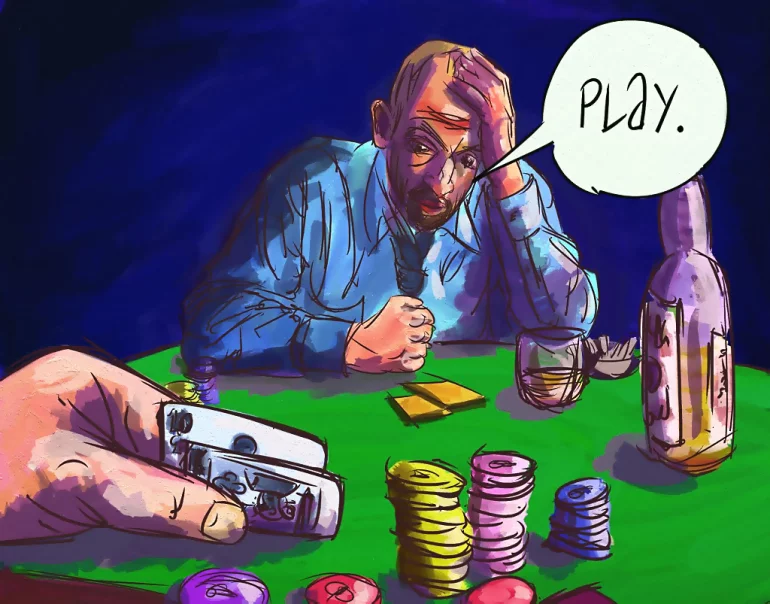So much is said about gambling addiction that some might think that all casino regulars suffer from it. On the other hand, many people experience it and can not assess the situation or recognize the problem. In this article on Casinoz, we will analyze problem gambling to help our readers understand themselves.

Compulsive gambling reveals itself in players' poor behavior, and even its negative impact and severe consequences can not restrain them.
People with other addictions (alcohol, drugs, and so on) act similarly.
Signs of Addictive Gambling
We should note that not all players who dedicate too much time to this hobby are addicts. There are several types of players, and several features characterize a pathological addiction to the game:
- Complete absorption in the game.
- Inability to control yourself during the game.
- Failure to stop the game.
- Negative consequences of the game (problems in the family, at work, and so on).
- Financial problems due to gambling.
Gamblers' attitudes toward money are also essential. Money is hardly the central goal in gambling. Like all people, gamers realize that it gives them freedom, safety, comfort, and even power. However, they lose awareness that the game can deprive them of everything, bankrupting them.
They refuse to understand that all casino games have a specific house edge that tips the scales in favor of the casino.
Gameplay becomes their primary goal, and the money is only a means for the game, so if they even have a big win, they tend to lose it quickly.
A person can become a victim of gambling addiction not only in a casino or slot machine hall. It can also be inspired by poker card games, betting on sports, lotteries, bingo, scratch cards, and more.
Perceptual Distortions
The money game is quite an unstable, unreliable, and inefficient way to earn money. You need excellent knowledge, extensive experience, and strong nerves to overcome the house edge in casino games. However, pathological gamblers do not perceive the situation adequately. Their thinking is distorted.
- They may believe that the outcome of the cards, numbers on the roulette wheel, or symbols on the reels is not random but depends on their zeal and affection for the game.
- They usually have a lot of prejudice associated with gambling. They use talismans, happy or unhappy clothing items, choose specific dealers, gestures, phrases, place in the hall, calculate lucky days, etc. They think that this should help to achieve the desired result.
- Gamblers may also believe that the game's outcome depends on their attitude and train of thought. Many of them consider themselves to be special and think that luck should reward them for their efforts.
- They may have an unhealthy attachment to the various betting systems, believing that they help to overcome the casino's advantage.
- Also, gambling addicts tend to forget about their losses but remember each win well and love to talk about them.
- In many cases, they endow inanimate objects involved in the gameplay with human characteristics. Hence, they believe that, for example, the cards can reward or punish them. Often, you can hear phrases such as "the Deuce can not hurt, it will not reset" and the like from players.
- Gamblers also like to talk about when they "almost won," believing this speaks in favor of their positive achievements. Consequently, they can not evaluate a picture of their wins and losses. Moreover, it spurs them to continue the game because the success was so close. Such cases stimulate the desire to play more than real winnings.
- All gamblers firmly believe that the money they lost is not lost forever, and they will return it. They think that a series of setbacks is a turning point.
Similar patterns of perception of reality lead to the formation of any addiction.
We should note that not all experts are unanimous about gaming addiction and assign it the status of a form of disorder. It becomes a severe social problem without the proper game culture.
Risk Factors
Certain events increase the likelihood of developing addiction. Check yourself against a list of questions. The more positive answers you give, the more cautious you should be about gambling.
Risk Factor Checklist:
- Have you won big recently?
- Do you have easy access to your favorite form of gambling entertainment?
- Are you ignoring guidelines for responsible gambling?
- Have you recently suffered a loss: divorce, death of a loved one, loss of a job, forced retirement from a favorite position, and so on?
- Do you have financial problems?
- Are you tired of life?
- Do you suffer from loneliness?
- Do you have a few hobbies and interests?
- Do you see no meaning in life?
- Have you suffered psychological trauma?
- Have you experienced violence? Do you have self-esteem problems?
All of the above factors put you at risk. In certain circumstances, even one of them is enough to make your gambling addiction turn into an addiction.
If you do gamble, choose casinos with responsible gambling tools.
| Casino | Withdrawal methods | Accepted currencies | |
|
+6
|
$, €, ₽, ₴ | ||
|
+4
|
$, €, R$, C$ | ||
|
+1
|
$, € | ||
| — | — | ||
|
+4
|
$, C$, zł, kr |
Basic Risk Groups
Gambling addiction can develop in any age, social, or other category: young and old, poor and rich, men and women. However, experts distinguish several groups whose members are at greater risk of becoming victims of gambling addiction.
- Elderly people: People in their old age suffer from many troubles: health problems, longing for children who have left, loneliness, psychological disorders, and so on. Often, they save themselves from them with the help of gambling entertainment. Given that they have a lot of free time and there is no one to control them, they can get too much into gambling. Gambling addiction in older people is discussed in detail in the article "Gray in the beard - gambling in the rib".
- Women: Gambling addiction occurs in women for many reasons. Still, most often they try to hide from life's difficulties and turmoil in this way, forget about emotional and psychological problems, go through a divorce, overcome loneliness, and so on. Nowadays, more and more women are addicted to gambling on the Internet, where it is even more difficult for them to keep themselves in control.
- Veterans: Former members of the military are often victims of gambling addiction. Upon retiring, they feel useless and try to distract themselves from bad thoughts through gambling. If you have worked in a casino or often visited gambling establishments, you probably know that there are several colonels and generals among the regular customers.
- Students: Having escaped their parents' custody and received more significant amounts of pocket money, many students turn into avid ludomaniacs. They spend hours at slot machines, bet on sporting events, and participate in poker tournaments. In addition, most of them actively use the Internet and mobile devices, which gives them access to thousands of gambling sites.
- Teenagers: Statistics on child gambling addiction collected by any organization in any region confirm that gambling has become a common phenomenon among minors. From an early age, children are mastering various gambling activities, and many of them have real addiction problems.
Let us remind you once again: Anyone can become a gambling addict. Even if you do not belong to one of the above categories, you should not relax.
Treating Gambling Addicts
If you find signs of gambling addiction in yourself, you should seek the help of specialists. You can also use the service from the international public organization Gamblers Anonymous International, which is represented worldwide.
The first symptoms seem innocent and insignificant. But if you ignore them, the trouble will soon become apparent.
A little statistical data:
- A study conducted by the Finnish organization Peluuri showed that 2.7% of Finns in the age group between fifteen and seventy-four suffer from some degree of gambling addiction.
- In a 2017 report, the UK Gambling Commission (UK Gambling Commission) claims that more than two million British people have signs of gambling addiction.
- The American Gaming Association claims that at least one percent of US residents can be considered pathological gamblers.
As you can see, gambling addiction is a pressing problem that only worsens every year. The best way to combat gambling addiction is to prevent the disease.
If you do not allow its development and stop the game in time, the addiction can be controlled. But what to do for those who have already fallen victim to gambling addiction?
How Do You Treat a Gambling Addict?
It is important to realize that addiction cannot be cured once and for all. Like any mental disorder, the craving for gambling will always remind of itself. To get rid of addiction, you need to change your lifestyle, get rid of many habits, and avoid temptations at all costs. This is the only way to overcome gambling addiction.
- Therapy: The therapeutic approach to treating gambling addiction usually combines several methods. Their combination allows you to maximize the effect. A specialist develops the complex, taking into account the characteristics of the patient.
- Cognitive Behavioral Therapy: CBT emerged in the 1960s. It is now widely used in treating all sorts of psychological problems. For some time, it has also been considered an effective way to get rid of gambling addicts. Communicating with a ludomaniac, a mental health specialist helps the patient to recognize the reasons that make the patient overly fond of gambling.
- Medications: Until recently, gambling addiction was not commonly treated with medication. Modern pharmacology offers new drugs that supposedly help reduce gambling cravings. Many experts question their effectiveness, but some doctors use them in the complex treatment of ludomania.
- Self-help groups: This is a common way to fight pathological addictions of any type. In the case of gambling addiction, it is not as widely used as when helping drug addicts or alcoholics, but it is also considered to be very effective.
- Family therapy: In most cases, gambling addicts cause a lot of trouble for their close relatives in one way or another. They lose money from the family budget, do not pay proper attention to their spouses, set a bad example for their children, or are not involved in their upbringing. Involvement of family members increases the effectiveness of gambling addiction treatment.
- Restricted access: The less temptation surrounding the ludomana, the higher the probability that he will be able to overcome the harmful passion for gambling. Of course, completely shielding modern man from gambling entertainment is extremely difficult, but you can get rid of the most obvious temptations. Do not visit entertainment complexes with casinos, slot halls, poker clubs, or bookmakers. You should install programs and plug-ins that block advertisements on the Internet. Avid fans of betting on sweepstakes should refuse to go to sports bars.
Conclusion
Let's hope that scientists will not leave the problem of ludomania without attention and in the near future will develop the most effective methods of treatment of this type of addiction.
We invite you to share your opinions on this issue in the comments to the article. Tell us about your personal experience with gambling addiction. Ask questions. Write reviews about these or those methods.














